Anthony Seymour
Tony, David, Jeff, Nora and George. London c.1976
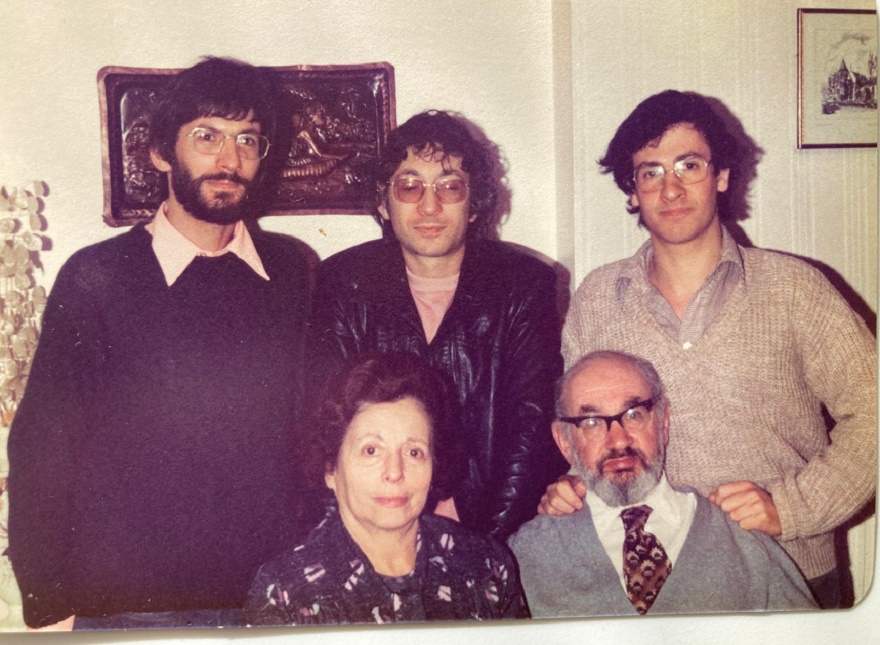
My brother David was born in London on 14th April 1943, but by the time I was born, on 27th September 1944, my mother had moved out of London to Southbourne (Bournemouth) on the south coast. As Nora said:
When I was expecting Tony – David was .. there was only 17 months between them – I was living in Maida Vale [with Raichka] and there were bombs in London … I used to put David under the piano! And my favourite uncle, Uncle Eugen, he used to come and see me a lot and he said ‘Darling, you must go and live in Southbourne with your mother! Because’, he said, ‘there’s no bombs down there ..You’ll have two young children to look after, you know.’
So I did go, and my mother rented a house, my sister Joyce kept house for her and looked after her – because she was a semi-invalid. And she had a large house, a really large house, there was plenty of room…. But all of a sudden she decided that – after the baby was born, we’d got to move out, she wouldn’t have me there with a baby (and with David) …..
But we were terribly lucky, because George … used to get week-end leave sometimes, and he had a very good way with him – I don’t know how it happened…… but he found this flat, it was a house in South Down, a very good position, one end of the road was the sea – I used to push the pram down to the sea – and the other end was the shops! So it was very convenient. And it was an ordinary smallish house, it had been converted into two flats …. my flat was upstairs and I had two bedrooms, one living-room, a kitchen and bathroom.
This maisonette was 8 Seaward Avenue, and I was born at a nearby nursing home in Clifton Road (now Seabourne House Care Home). My brother having been named after our paternal grandfather and (as middle name) maternal grandfather Alfred, I was given the middle names Henry (after my maternal great-grandfather Heinrich Mayer, also my maternal uncle Henry Mayer) and George (my father). Anthony was possibly after the politician Anthony Eden.
My father was away in the army except for brief periods of home leave, and this photo was sent to him in February 1945.
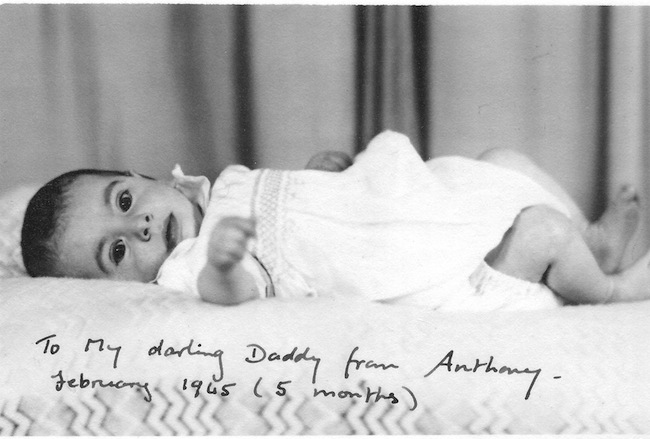
By July 1945 I was nine months old, the war in Europe was over, and we were enjoying our time on the beach.
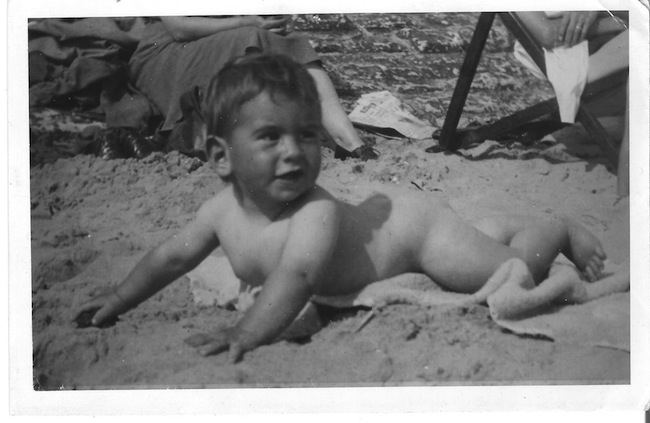
We were still living with my mother in Southbourne in August 1946.
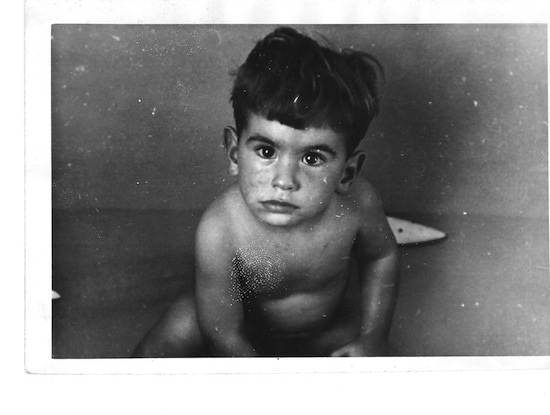
On the beach with Auntie Joyce, Raichka, David and Nora.
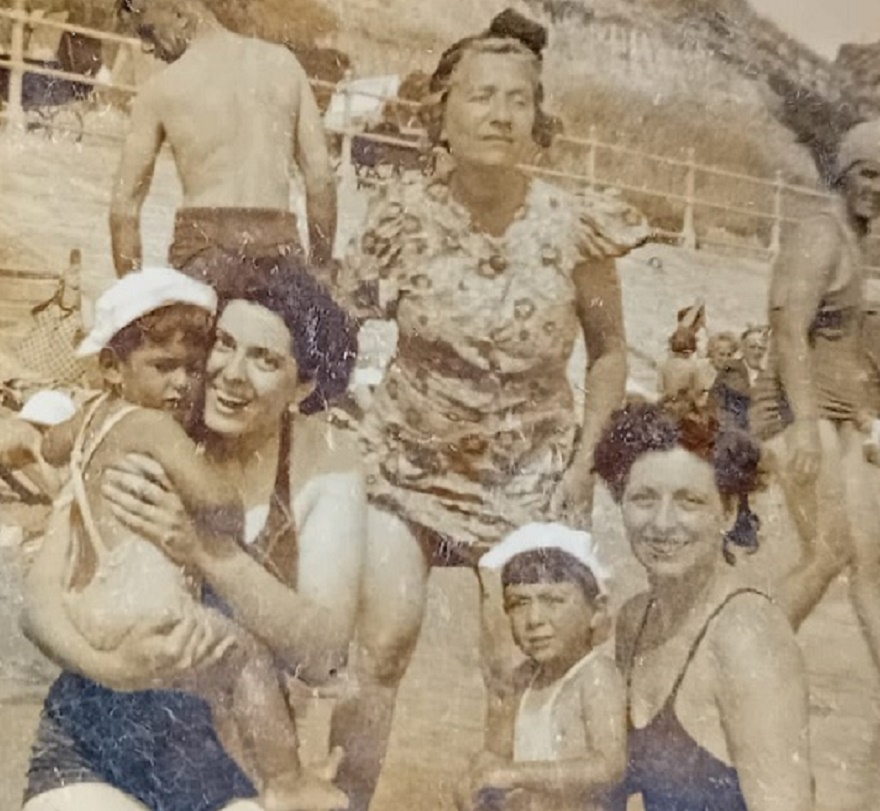
Nora recounted how we were able to join George in Berlin later in 1946:
[George] wanted me and the children to go, the army didn’t allow that but the Control Commission did. They’d offered him his demob and the big heads there, in Berlin, said ‘Oh we wish you wouldn’t go, you wouldn’t take your demob because you’re doing such a good job’. And he said ‘Well I’ll stay on but only if my wife and children can come’….. Tony was just two and David was three and a half. So they enquired and they said the British army didn’t let families go – all the other nationalities did but the British didn’t, but ‘You can take your demob and join the Control Commission, and you’ll be doing exactly the same job but your wife and family can come’.
My preparation for Germany may have been “Don’t mention the war!” In Berlin my brother David is smiling but I am looking typically sad.
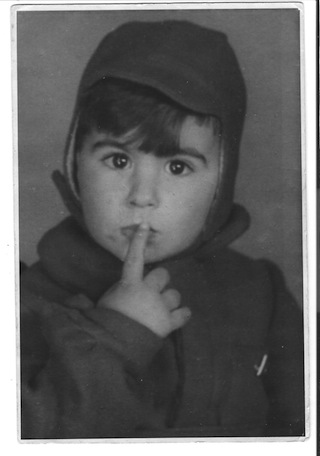
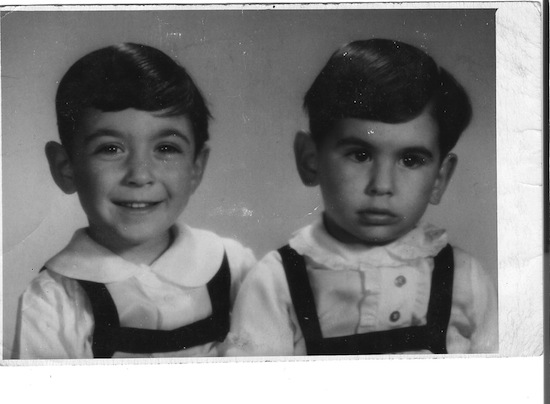
There is more about our time in Berlin in 1947 on George’s page
We returned to England in September 1947. After a few months with my mother in Southbourne, we joined my father in what had been Raichka’s flat: 67 Rodney Court, Maida Vale. My father needed to be in London to practise law (he had qualified as a solicitor some eight years earlier). While we were living in Rodney Court, David was old enough to attend school, and after the first few months I went to a delightful nursery class. Nora told the story:
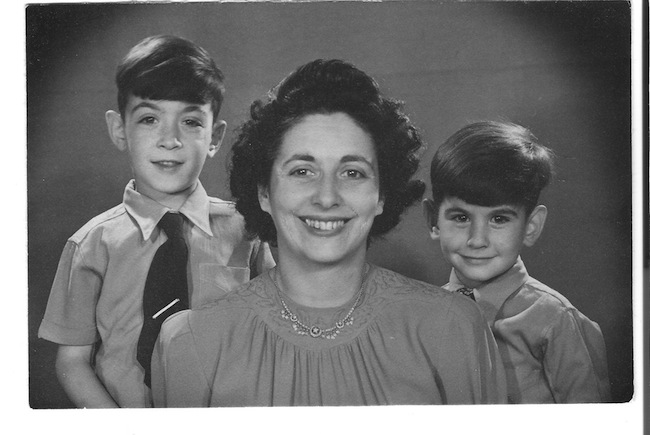
And there was a school, it was much further for me to walk but it didn’t matter, I had to walk right up, past Lords Cricket Ground, and .. I don’t know if you know there’s a big roundabout there … and that’s the beginning of St Johns Wood High Street and there was this school – I can’t remember what it was called. And he said ‘They’ve got a nursery class and I think they’d take the little one as well’. That was Tony.
I believe this was Barrow Hill Junior School. There was an area where there were little beds, and nap-time at the nursery is definitely my happiest memory from school days.
In 1949 my parents bought a new house in suburban Kingsbury. Nora’s story continues:
They stayed there [at Barrow Hill] until the day we moved to Kingsbury – that was the only thing I was sorry to leave in Maida Vale: I was pleased to be going to live in Kingsbury but I was sorry about that school because it was such a good school and they were very happy there.
And when we moved to Kingsbury, you see, they had to take David - Fryent School it was called – they had to take David but they wouldn’t take Tony because he wasn’t five for about three weeks, you see, and you had to have turned five on the day the term started. So he had to wait. And he had this imaginary friend, and my mother-in-law … she didn’t have much of a sense of humour, she didn’t understand about imaginary friends, and when she came once she didn’t kiss the air and say ‘Hello Icke, how are you?’ and he cried! ‘What’s the matter?’ ‘Raichka didn’t say hello to Icke’, you see. It was really real to him….
We continued to visit Southbourne, where my maternal grandmother still lived, especially for summer holidays. This horse ride was in August 1952. When I was 10 I liked to play cricket …..
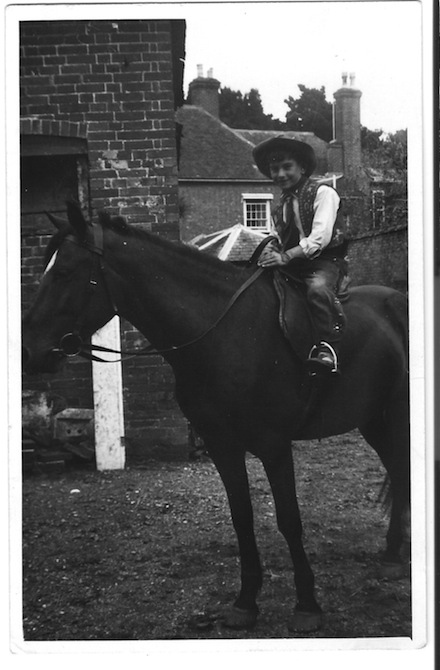
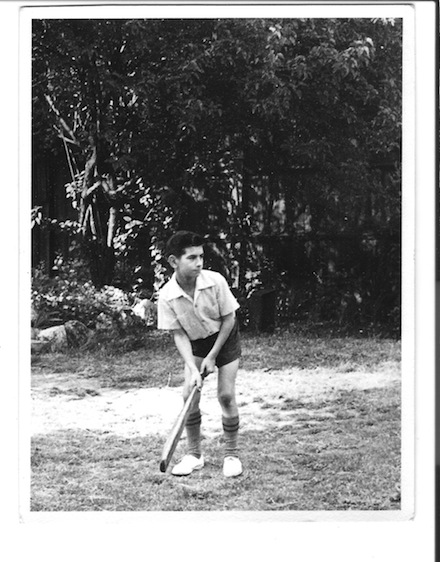
… and I had my first car.
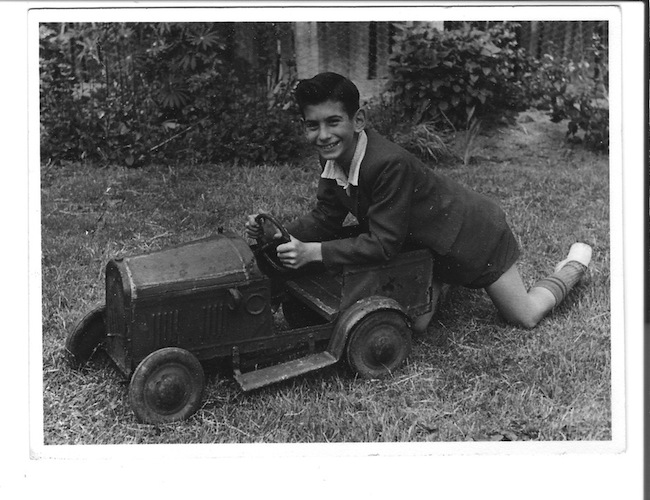
Piano lessons 1954-1956
But my big passion was playing the piano.
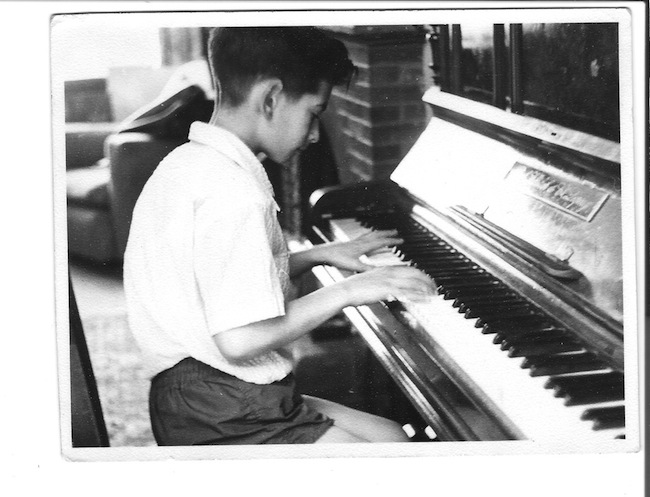
Raichka was living in the U.S.A. at this time (1954), so I was sent for an audition with a friend of hers from Russia, Madame Biek. She not only took me on but charged no fees; I believe my father had done legal work for her free of charge. I travelled alone on Saturday mornings to her house at 8 The Leys, Hampstead Garden Suburb, taking two buses. These were not simple or brief piano lessons. The experience occupied the whole morning, and entailed a number of individual and group sessions (including a little orchestra at which we took turns to conduct), culminating in an encounter with the grand lady herself.
Vera Biek (née Vinogradova) (1895-1982) had met her husband Hermann Biek, also a musician, in Petrograd and as a young married couple were described as “probably, the most flamboyant personalities among us, the conservatory students.” When they graduated in 1920 both were offered teaching positions, and Vera was given an excellent recommendation by Glazounov himself. But because of the civil war they left Petrograd, and lived for some years in Hermann’s home town of Talinn, Estonia. In 1927 they and their two children arrived in Berlin where Hermann adopted the stage name Ben Berlin and established his own orchestra, the Ben Berlin Tanz Orchester, which became one of the most popular orchestras in Germany. When the Nazis took power in 1933 the Biek family had to leave Germany. In 1936 they settled in London and Vera began to give private piano lessons. Hermann also taught and composed music; he had a small jazz band and “wrote music for it day and night”. But in 1944, when he was only 47, he died at his desk “without realizing his immense talent.” (Mark Rybak: About the Bieks)
Among Vera Biek’s pupils were Peter Ustinov and the theatre director Peter Brook, who writes about his lessons in the 1940s in his autobiography (Threads of Time: A Memoir, Methuen, 1999, pp 20-22):
Her expectation was quite simple: she wished for every condition of a fully prepared concert performance to be observed at the first lesson. Without any indulgence, she swept away the notion that progress comes gently, step by step; it was now or never …. Music, she insisted, must be shared, so all shyness and timidity were swept away. ‘I’m not ready’ was not allowed, for as soon as a piece was learned, it had to be played in public.
I now know that these music lessons were my only dramatic academy, for although I never became a musician, all my work to this day is an attempt to put into practice what I learned during these extraordinary sessions. Mrs Biek showed me the true meaning of what a teacher can be, she enabled me to discover that the same principles govern all the arts, and her approach to music became a way both into theatre and into life.
This is my report after the first year with Mme. Biek:
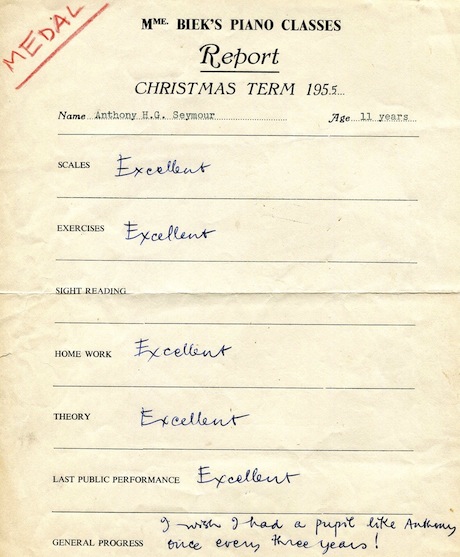
The following year, 1956, I was entered into two piano competitions: the Wembley Music and Drama Festival (where I got a Merit), and the Watford & District Music Festival, where I was awarded Second Prize. Nora gave this account:
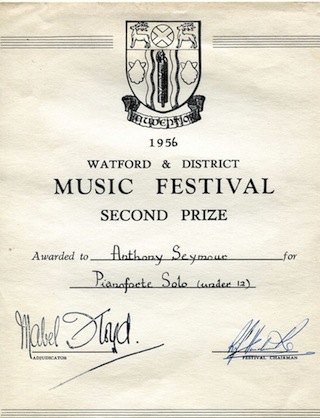
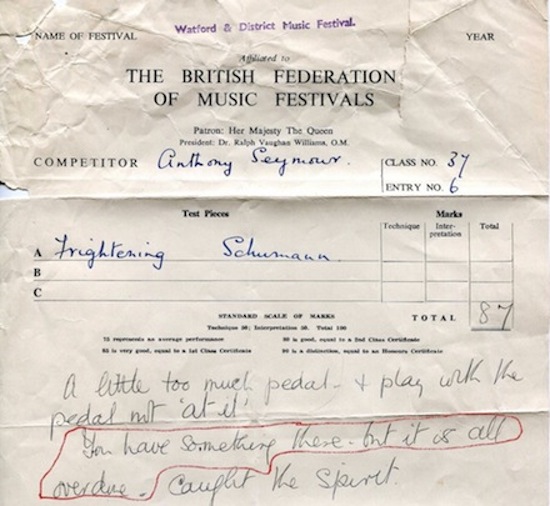
And apparently they made him and a girl play a second time, they couldn’t decide who to give the prize to – that’s how good he was in that short time, you see … The girl got the [first] prize…. He was terribly keen on the piano. he played beautifully, I mean … recently [1998] several people have said ‘I remember your son moving me to tears’ - the way he used to play, because he put such a lot of feeling in his music.
But he was very, very good and he asked could he practise – he wanted to practise! I mean when I learnt piano we didn’t want to practise! But he wanted … and he asked could he practise on the piano at school, that was when he was at primary school, and they let him. And then they had a new Head, it was a woman, at his primary school, and when they were leaving and going to Grammar School the last term at the old school they had a sort of farewell, they had a concert …. And she decided that all the children who learnt piano should play something …. I was there and I think his piano teacher [Mme Biek] came, she was standing at the back …
…She was very good this Headmistress, she made the children stand in the front and say ‘I am now going to play …’ whatever it was, you see. And so out of the four Tony was the last one, and the other children all … looked at the music and played like this … But he used to learn it all by heart. So this little voice said …’I’m now going to play the Moonlight Sonata by Beethoven’. And he sat there and he played – well like an adult. You see he didn’t have to look at any music or anything… I was in tears! Because he had a standing ovation – everybody stood up and cheered, and called out ‘encore!’ Can you imagine? And he hated adulation, he was embarrassed I suppose, and he didn’t like it. And on the way home .. they were all crossing the road! We were walking …down the road and they were saying to him ‘How wonderful you were! … It was a treat to hear you … ‘ and all this - and he hated it!
……And after that do at the school when he had that standing ovation, the Headmistress sent for us and she said he was so good that she suggested he took it up as a career, a professional pianist. But George said ‘No, I’ve had my family in the musical profession and there are so many good pianists and not enough jobs to go round.’ And so George wouldn’t agree, and I mean I went by what he said – I knew what he was talking about. And the thing was, if he’d been bad at his school work .. he was very good at his school work as well. So the thing is … So we let him do it as a hobby.
After I started Grammar School in 1956 I never had another piano lesson, though for many years I played for Raichka and she gave me the benefit of her experience of Russian musicianship. She would certainly never have put me down with the comment: “You have something there but it is all overdone”!
That thing about moving people to tears with my piano playing…. It reminds me of the 1911 tribute concert for Tolstoy where the Tchaikovsky Piano Trio in A Minor was performed with Rosalia Pasternak at the piano and Sisserman on the cello, and Aleksander Pasternak describes Koussevitsky “brushing away a tear”. And I remember that after the sudden death of David Oistrakh on 24th October 1974, his long-term musical associate and friend Yehudi Menuhin was interviewed on the radio and said:
“Being Jewish is nothing to do with orthodoxy, it is about giving voice to emotions.”
My own experience of growing up in a Jewish family was coloured by the fact that my father George and grandmother Raichka were utterly non-observant and rarely set foot in a synagogue. Nora was the observant one, attending synagogue, attending classes to improve her Hebrew, and even giving readings at her Liberal Synagogue. When we observed Jewish high days at home it was always Nora who took the role of running the service, my favourite memory of which is drinking Palwin - Palestian Wine dating from 1898. Every year David and I were rebuked for giggling at the words on the label reading “strictly kosher, passed by the Chief Rabbi”.
Mischa Sisserman Michaeloff
Mischa Sisserman, born in Russia in 1890, was an uncle of my father George. He and his wife Anna (whom we called Anita) left Russia after the revolution and - like the Biek family - settled in Berlin. In 1926 he was living in Steinplatz and collaborated with the composer Prince Joachim of Prussia. In 1931 he published compositions as “Mischa Michaeloff of Germany” with M. Sisserman listed as a pseudonym. In the 1932 Berlin phone directory he is listed as a conductor and composer at Bamberger Str.
Again like the Bieks, Mischa Michaeloff left Berlin after 1933 and moved to London where he was quite successful with his “gypsy orchestra”. Michaeloff became a British citizen. At the 1939 census Mischa and Anna (Anita) were living at 127 Chalkhill Road, near Wembley Park tube station, and they appear at the same address on electoral registers from 1949-1956.
I am sure that the Michaeloffs knew the Bieks. He knew about Vera Biek’s teaching methods, including the little orchestra at which we took turns to conduct, because he gave me a cut-down professional conductor’s baton. In February 1956, at the time of the Watford Music Festival, he gave me a piano version of Handel’s “Surprise” symphony.
Mischa and Anita Michaeloff returned to Berlin, and Mischa appears in the phone directory for 1958 (“composer and conductor”) at Hewaldstrasse. After Anita’s death in 1960 he appears in the phone directory at Marathonallee (“composer”) until 1967, when he was aged 77.
Left: Handel’s “Surprise” symphony from Mischa Michaeloff 1956. Right: the grave in Berlin after Anita’s death 1960.
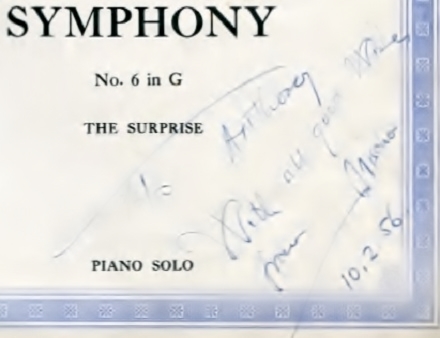
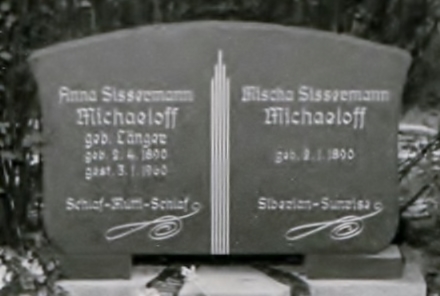
Schools and universities
While I was at primary school I took part in elite sports events.
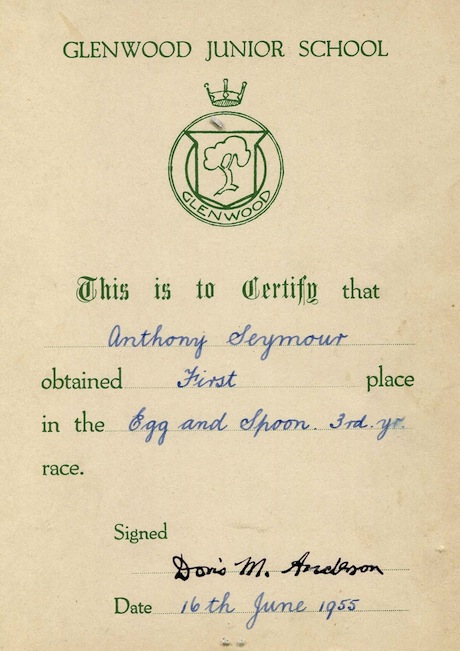
I was in the football team (Left: second row from the front, on the right) and captain in my last year (Right: centre of front row)
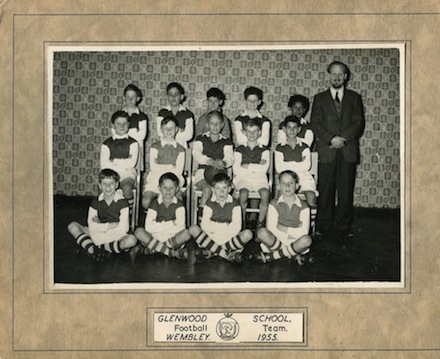
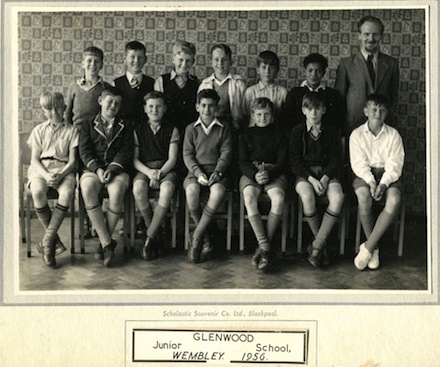
At this time I was very keen on country dancing, something which was possible in a mixed school (Left: second row from the front, fourth from the right). But such things sadly ended when I moved on to a single-sex secondary school (Right: second row from the front, third from the right)
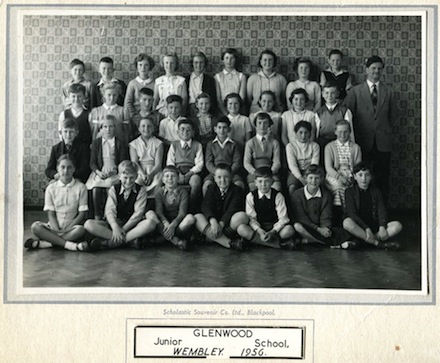
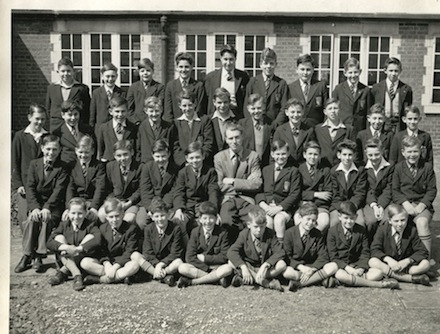
This was Orange Hill School Grammar School for Boys, to which I followed my brother David in 1956. The Orange Hill Grammar School for Girls was next door, the other side of high walls and metaphorical barbed wire. In 1963 I followed David to Edinburgh University, where he was editor of the student newspaper and cast me in the role of Inspector Maigret, sporting the first of my famous series of hats.
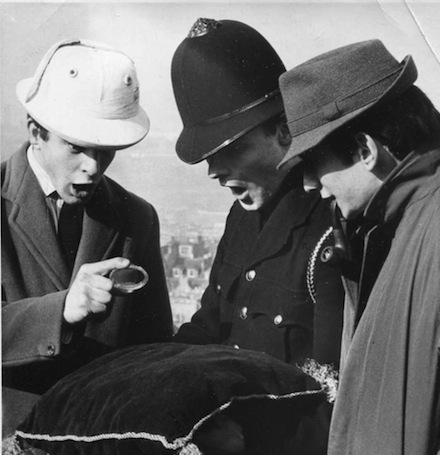
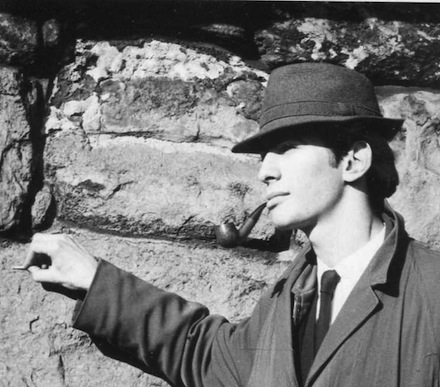
In 1964 I bought this 1937 Austin 10 for £35. It was still running when I left England for Africa in February 1970.
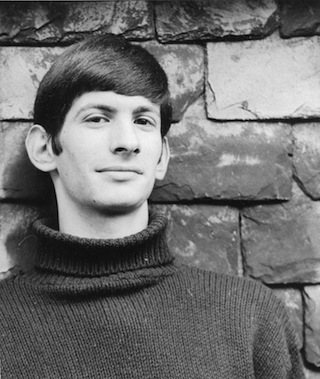
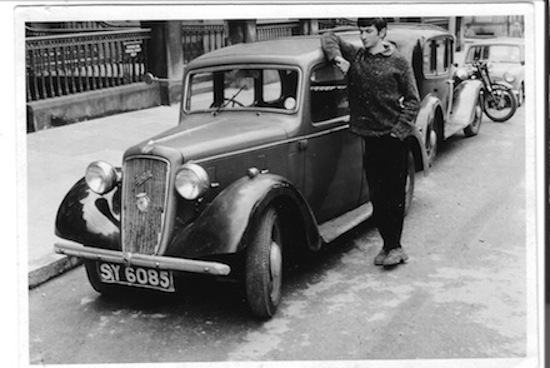
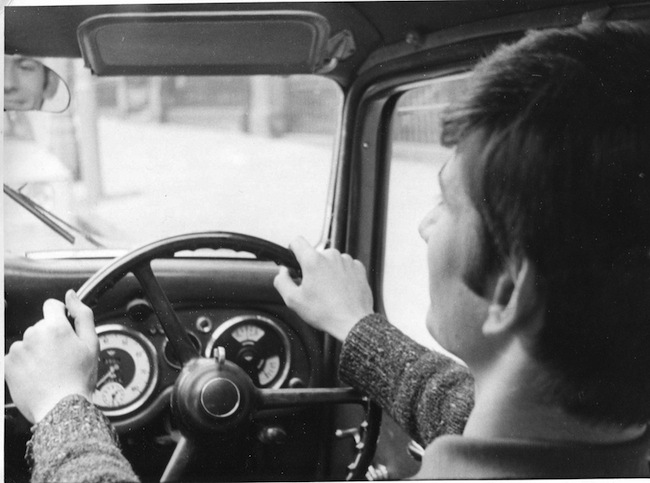
Page last updated 29 Oct 2024.